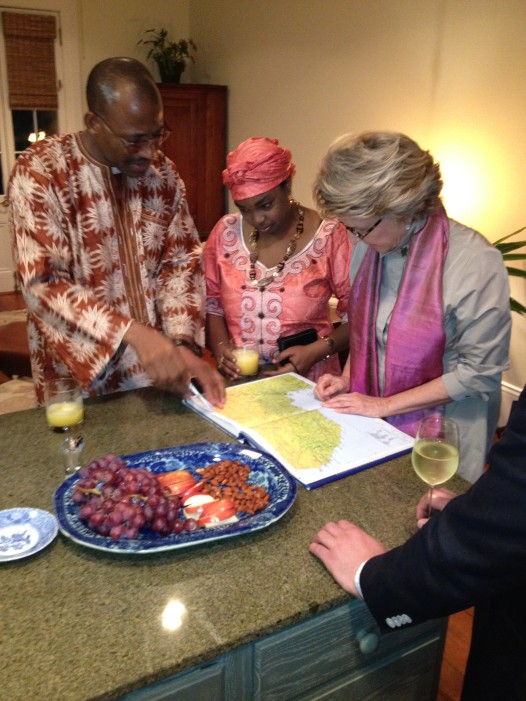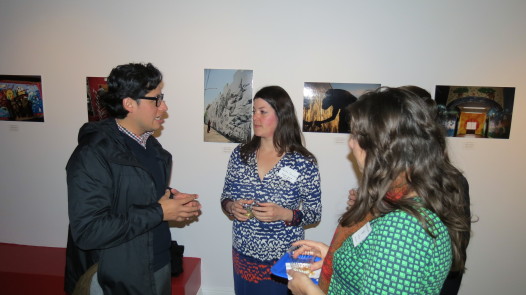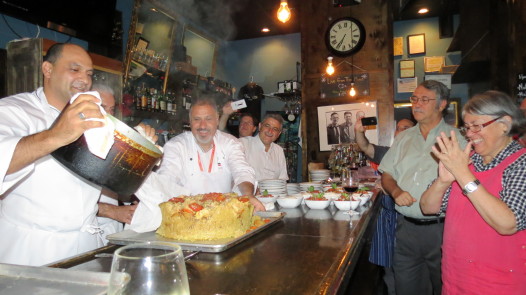
A NODC member with two visitors from Africa at a home hospitality meal, at which members host international visitors in their homes for dinner. Photo: NODC
As a major port city and one of the most well-known U.S. cities internationally, it is no wonder that New Orleans is such a tourist magnet. While many of these tourists visit for pleasure, in 2013 only about 10% of them came for professional reasons.
The U.S. Department of State has been bringing leading international professionals to New Orleans since at least 1944 when it opened a reception center for its flagship exchange program, the International Visitor Leadership Program. This reception center morphed into the New Orleans Citizen Diplomacy Council, formerly known as the Council for International Visitors of Greater New Orleans, a nonprofit that has been actively engaged in hosting these international leaders during their New Orleans visits since the 1970s. These visits, while still very much under the radar, not only promote our city on a global scale, but also provide opportunities for New Orleans and its citizens to build professional partnerships and personal relationships — a practice known as citizen diplomacy.

Mexican mural/graffiti artist Emmanuel Audelo Enriquez during a reception at the Mexican Consulate speaking with NODC members and board members. Photo: NODC
Citizen diplomacy takes place every day around the world when a person from one country engages with a person from another country. These interactions, whether purposeful or inadvertent, can be positive or negative, but in either case, influence sentiments that people have about other countries and cultures. Citizen diplomacy puts the power into the hands of ordinary citizens giving them the capacity to breakdown stereotypes and can allow international visitors to perceive New Orleans and the United States in a positive light. This acts as a two-way street by providing a forum for New Orleanians and Americans in general to expand their perspectives.
Although there is a limited focus on international relations in New Orleans by both local and international governments, what our city does have is citizens and organizations who choose to reach out on a person-to-person level to build these relations. When the New Orleans Citizen Diplomacy Council hosts these current and emerging international leaders, the bulk of the visits are spent in the offices and homes of a diverse cross-section of New Orleanians who volunteer their time and knowledge to spend with these visitors. Local universities, schools, nonprofits, municipal government agencies, city councilmembers, businesses, news media, artists and citizen activists have been stepping up for decades to spend an hour exchanging best practices with these visitors; and members of the Diplomacy Council host these visitors in their homes for meals allowing them to delve deeper into the lives of their guests by simply breaking bread together.

A group of chefs from Jerusalem with Liz Wiliams of the Southern Food & Beverage Museum and tour guide Robert Freeland at Three Muses during a private event. The chefs cooked upside down chicken for the guests. Photo: NODC
By engaging in citizen diplomacy New Orleans, and more generally in U.S., communities are able to broaden their perspectives. Opportunities to learn about a Yemeni journalist’s exile from his country, a Mexican artist’s work with young graffiti artists, or the work that preservationists from Kosovo are involved in to promote their cultural heritage post-war can only elevate our awareness of what others are facing, enhance our appreciation of the opportunities granted to us and expand our own creative dexterity — exposing inventive solutions to our own communities’ problems. In a globalizing world that will probably never look back, New Orleanians have the opportunity to take international relations into their own hands.
One day, some of these visitors may become political leaders in their respective nations — in fact, many already have, including Mexico’s former president Vicente Fox; Britain’s first female prime minister, Margaret Thatcher and Malawi’s current and first female president, Joyce Banda. As citizen diplomats, we can determine whether these individuals look back fondly upon their New Orleans and U.S. experiences — experiences that can shape major decisions that affect us individually, and as a nation.
What if you could say that you shook that foreign leader’s hand? What if you could say that you helped shape our international relations with a particular country by spending just an hour with a foreign visitor? Even if you never leave New Orleans, your kindness and your ideas can reach across religions, ethnicities and borders.
For more information on or to get involved with the New Orleans Citizen Diplomacy Council and upcoming opportunities, visit www.nocdc.com. For more information about the U.S. Department of State’s International Visitor Leadership Program, visit http://eca.state.gov/ivlp.
Emily Ramirez Hernandez is the Program Coordinator at New Orleans Citizen Diplomacy Council.
 NOLAbeings Multimedia artist Claire Bangser created NOLAbeings as a portrait-based story project that marries...
NOLAbeings Multimedia artist Claire Bangser created NOLAbeings as a portrait-based story project that marries...  Voodoo in New Orleans: Reviving history: New Orleans fortune telling This article takes a deep dive into the history of Voodoo in New Orleans, its hybridization with Catholicism, and its present-day place in the city's culture. The author visits fortune-tellers in the French Quarter, using their guidance as a tool for introspection rather than a deterministic predictor of the future. Through her experiences in New Orleans, the author feels a mystical connection to both the past and the future.
Voodoo in New Orleans: Reviving history: New Orleans fortune telling This article takes a deep dive into the history of Voodoo in New Orleans, its hybridization with Catholicism, and its present-day place in the city's culture. The author visits fortune-tellers in the French Quarter, using their guidance as a tool for introspection rather than a deterministic predictor of the future. Through her experiences in New Orleans, the author feels a mystical connection to both the past and the future. 